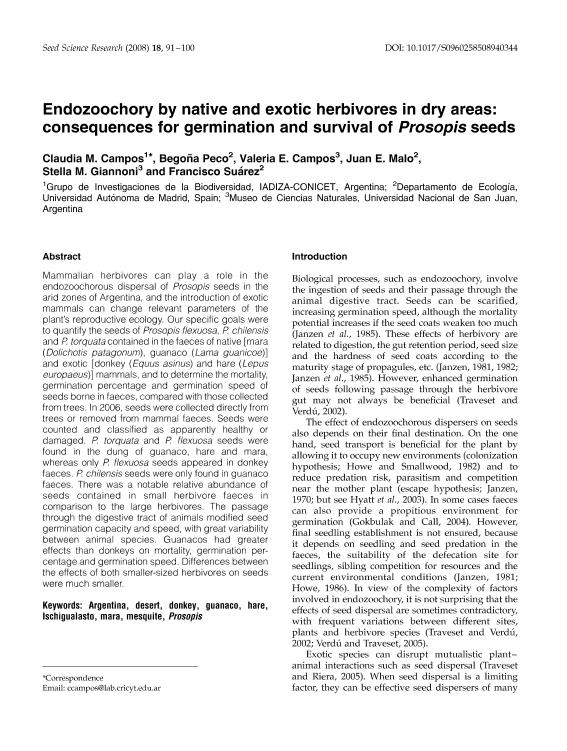Artículo
Endozoochory by native and exotic herbivores in dry areas: Consequences for germination and survival of Prosopis seeds
Campos, Claudia Monica ; Peco, Begoña; Campos, Valeria Evelin
; Peco, Begoña; Campos, Valeria Evelin ; Malo Arrázola, Juan Esteban; Giannoni, Stella Maris
; Malo Arrázola, Juan Esteban; Giannoni, Stella Maris ; Suárez, Francisco
; Suárez, Francisco
 ; Peco, Begoña; Campos, Valeria Evelin
; Peco, Begoña; Campos, Valeria Evelin ; Malo Arrázola, Juan Esteban; Giannoni, Stella Maris
; Malo Arrázola, Juan Esteban; Giannoni, Stella Maris ; Suárez, Francisco
; Suárez, Francisco
Fecha de publicación:
06/2008
Editorial:
Cambridge University Press
Revista:
Seed Science Research
ISSN:
0960-2585
Idioma:
Inglés
Tipo de recurso:
Artículo publicado
Clasificación temática:
Resumen
Mammalian herbivores can play a role in the endozoochorous dispersal of Prosopis seeds in the arid zones of Argentina, and the introduction of exotic mammals can change relevant parameters of the plant's reproductive ecology. Our specific goals were to quantify the seeds of Prosopis flexuosa, P. chilensis and P. torquata contained in the faeces of native [mara (Dolichotis patagonum), guanaco (Lama guanicoe)] and exotic [donkey (Equus asinus) and hare (Lepus europaeus)] mammals, and to determine the mortality, germination percentage and germination speed of seeds borne in faeces, compared with those collected from trees. In 2006, seeds were collected directly from trees or removed from mammal faeces. Seeds were counted and classified as apparently healthy or damaged. P. torquata and P. flexuosa seeds were found in the dung of guanaco, hare and mara, whereas only P. flexuosa seeds appeared in donkey faeces. P. chilensis seeds were only found in guanaco faeces. There was a notable relative abundance of seeds contained in small herbivore faeces in comparison to the large herbivores. The passage through the digestive tract of animals modified seed germination capacity and speed, with great variability between animal species. Guanacos had greater effects than donkeys on mortality, germination percentage and germination speed. Differences between the effects of both smaller-sized herbivores on seeds were much smaller.
Palabras clave:
ARGENTINA
,
DESERT
,
DONKEY
,
GUANACO
,
HARE
,
ISCHIGUALASTO
,
MARA
,
MESQUITE
,
PROSOPIS
Archivos asociados
Licencia
Identificadores
Colecciones
Articulos(CCT - SAN JUAN)
Articulos de CENTRO CIENTIFICO TECNOLOGICO CONICET - SAN JUAN
Articulos de CENTRO CIENTIFICO TECNOLOGICO CONICET - SAN JUAN
Articulos(IADIZA)
Articulos de INST. ARG DE INVEST. DE LAS ZONAS ARIDAS
Articulos de INST. ARG DE INVEST. DE LAS ZONAS ARIDAS
Citación
Campos, Claudia Monica; Peco, Begoña; Campos, Valeria Evelin; Malo Arrázola, Juan Esteban; Giannoni, Stella Maris; et al.; Endozoochory by native and exotic herbivores in dry areas: Consequences for germination and survival of Prosopis seeds; Cambridge University Press; Seed Science Research; 18; 2; 6-2008; 91-100
Compartir
Altmétricas



